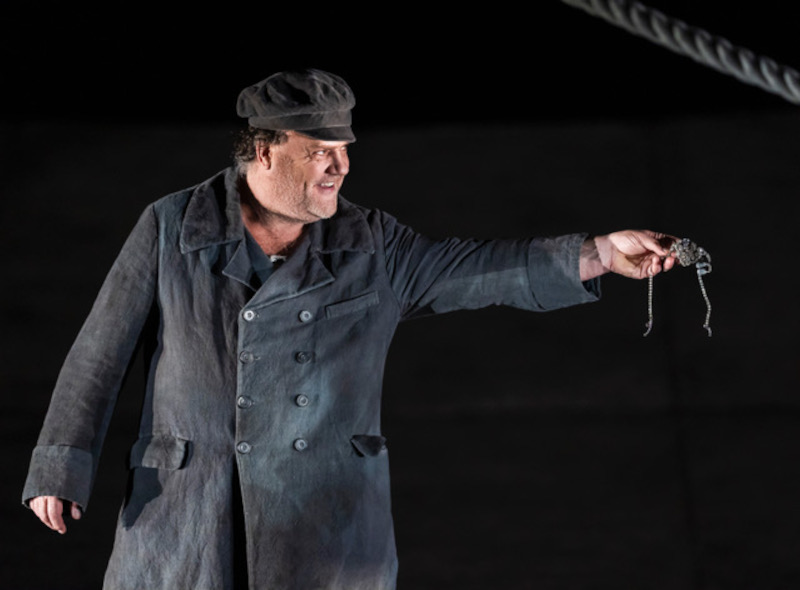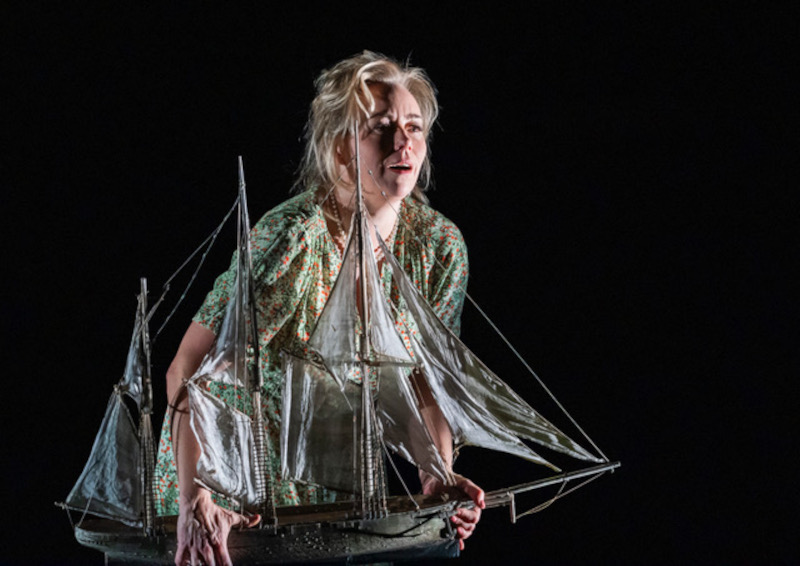Tim Albery’s production of Wagner’s Der fliegende Holländer – which presents, as the composer intended, the opera in one unbroken, 140-minute span and concludes with the ‘Dresden’ ending of emphatic repeated chords – returns to Covent Garden in its third incarnation. This Dutchman’s ship docked previously in February 2009, returning in 2015. The connecting thread between these performances is the Dutchman of Sir Bryn Terfel. I heard the 2015 incarnation, wonderfully conducted by Andris Nelsons, via a simulcast; so it was good to appreciate the staging live.
And Albery’s take certainly has a visceral impact. The depiction of a storm via a front cloth during the Overture (and a sweeping light – a lighthouse? The Dutchman’s ship?) like Wagner’s music, leaves one in no doubt of the turbulence, both of weather and of emotions. The stage itself is often minimalistically bare, set on what looks like the side of a ship. The Dutchman enters, pulling a rope that might equally be a mooring rope or an oblique nod to the Norn’s thread of fate. Whichever way, the Dutchman is unutterably burdened, and Albery conveys this in the simplest, but most effective of means. The arrival of the spinning / sewing factory, dropped from above is slick as can be; Albery seems to make a distinction between dark and gray colours for the Otherworld and more vibrant clothing for the living. And yet the factory is clinical, a regimented place set against the more mobile if tormented roaming of the Dutchman and his crew.
A model of the Dutchman’s ship is pretty much omnipresent, and it is this which Senta holds at the opera’s close, alone, bereft, mourning the disappearance of her Dutchman after his ‘identity reveal’ (a trope that is to gain ever-increased importance in Wagner’s output, from the close of Lohengrin via Siegmund in Walküre to Parsifal). The staging is harrowing in its unrelenting oppression (the brightness of the spinning chorus is a flicker of light set within a cloak of blackness). We are persuaded in no uncertain terms that this is major Wagner, not a step en route to the Ring and beyond. When the Dutchman and Senta have their scene, alone together, they sit on a couple of functional chairs, not touching, the distance between them vast and yet the pull undeniable.

A staging such as this relies more than most on lighting, and David Finn as Lighting Designer hit his brief perfectly. This was the art of staging at its finest, (pardon the pun) illuminating Michael Levin’s sets from within via light and shadow. If Der fliegende Holländer is, as Wagner designated, a “Romantische Oper,” it was perfectly honoured by Albery’s modern, Minimalist staging, an impressive feat of juxtaposition.
If Henrik Nánási’s conducting was not quite of the quality of Nelsons in 2015, he found plenty of detail and clearly inspired fine playing from the orchestra. He has previously conducted Jenůfa (2021) and Simon Boccanegra (2018) at Covent Garden.
Sir Bryn’s Dutchman retains its tortured demeanour. The miracle of Terfel’s interpretation is the sheer clarity of diction combined with a sure sense of line and a complete immersion in character. His voice might not quite be as imposing as a few years ago, but his musical integrity is beyond compare, and the power remains. If his Falstaff is perhaps Terfel’s signature role, his Dutchman comes a close second. The sheer authority of ‘Der Frist ist um’ set the stall for the performance as a whole, its climactic ‘Niemals der Tod’ (Death never comes) a proper existential cry, angst writ large. Terfel’s portrayal of the Dutchman’s torment and internal struggles was powerful indeed.
His Senta was the magnificent Elisabet Strid, astonishingly making her Royal Opera debut. Her Sieglinde in Walküre in Gothenburg as part of Stephen Langridge’s Ring in December 2019was heart-stoppingly powerful, and her Senta exhibited similar traits. She has the gentleness but also the power to provide a great Senta, her Ballad absolutely gripping from first to last (and beautifully complemented by some finely pointed accents from the orchestra), her pitching impeccable throughout. Her voice is pure, a true soprano, but – vitally important – never shrill.

Strid was complemented by the fine, lush mezzo of Ukrainian singer Ksenia Nikolaieva as Mary (her name is sometimes rendered as ‘Kseniia’ thanks to the delights of transliteration). An ex-Jette Parker artist, her velvety voice has previously impressed as Giovanna in Rigoletto in 2002 at this house; her Suzuki in Butterfly in the 2022 Jette Parker performance is seared into the memory. She was no less transfixing here. It is only a matter of time that she moves from making her mark in subsidiary roles to taking on those major roles; it would be fascinating to hear her Amneris in Aida at Oper im Steinbruch later this year.
How satisfying it is to attend an opera and find a ‘discovery’ in the cast. Here, it was the Steersman (Steuermann) of American-Finnish tenor Miles Mykkanen (who has this season debuted at San Francisco as the Groom in the North American premiere of Saariaho’s Innocence, a role he will sing at Covent Garden later this year). Here is a singer of vast power and lyricism, who convinced us that the Steersman is really a vital cog in the machine, whose dramatic abilities match his fine vocal apparatus. Mykkanen’s activity seems almost exclusively States-side (with the odd foray to Aix, Vilnius and Hamburg); interestingly, he has sung Albert Herring (Albert Herring, Britten) at Chicago’s Opera Theater, a mouth-watering prospect and a role one hopes he will reprise.
It is not by accident I mention the Steersman first after the Dutchman. The other male voices were perhaps not uniformly stratospherically fine. Toby Spence was in good if not exceptional voice as Erik. The role of Daland seems particularly cursed of late. The performance in 2015 I heard found Peter Rose under the weather with a seasonal cold; no such vocal problems for Stephen Milling on this occasion, but he seemed a stratum lower than his colleagues, less inside his character, a more externalised impression that simply led to my not believing in the character. Vocally, this Daland was fine if not exceptional; dramatically, he felt out of place.
I find myself running out of superlatives when it comes to the Royal Opera Chorus, the male contingent lusty and tireless, the female members full of nuance.
The finest compliment for the cast and chorus is that this was not the Bryn Terfel Show, despite his magnetically gripping assumption of the titular role. Of the established names, Elisabet Strid shone like a morning star; Both Ksenia Nikolaieva and Miles Mykkanen perhaps established themselves beyond doubt as future forces to be reckoned with (and of the two, I would more likely travel to hear Mykkanen).
A compelling evening. By all means go for Sir Bryn; but his is not the only star in this stormy firmament.
Colin Clarke
Der fliegende Holländer
Music by Richard Wagner
Libretto by Richard Wagner
Cast and production staff:
The Dutchman: Sir Bryn Terfel; Daland: Stephen Milling; Senta: Elisabet Strid; Erik: Toby Spence; Mary: Ksenia Nikoaieva; Steersman: Miles Mykkanen.
Director: Tim Albery: Designer: Michael Levine; Lighting design: David Finn; Movement director: Philippe Giaudeau, Chorus & Orchestra of the Royal Opera House. Conductor: Henrik Nánási.
The Royal Opera House, Covent Garden, London, Thursday 29th February 2024
All photos by Tristram Kenton © ROH 2024.